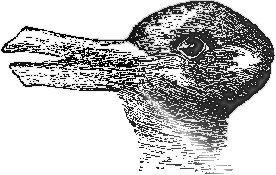Serendip is an independent site partnering with faculty at multiple colleges and universities around the world. Happy exploring!
Anne Dalke's blog

ambigous figures--and free will
When Jenna highlighted the passage in The Hungry Tide where Piya shows the guard a picture of the Gangetic dolphin and "he asked if it was a bird," I thought immediately of the ambiguous figure of the "Rabbit Duck" (do you know this? can you see both?)

Ambiguous figures like this one are important in illustrating not only (as Jenna said) that "people with different backgrounds perceive things differently," but also that everything we perceive we might perceive otherwise (or, as I still tell my children, "you can always tell a different story"). If you are interested in thinking-or-writing more about this phenomenon (which is a visual extension of the conversation we had yesterday about the imprecision of language) you might want to explore some the material on Serendip about ambiguous figures--as a demonstration of informed guessing and (always my friend Paul's punch line) free will....

as promised: some handy links for further reading...
You can find the the map of the Sundarbans @ the start of The Hungry Tide @
http://www.amazon.com/The-Hungry-Tide-A-Novel/dp/B003IWYKOO#reader_B003IWYKOO
Albert Camus’ 1957 lecture, “Create Dangerously":
http://www.nathanielturner.com/createdangerouslycamus.htm
Jane Tompkins, "Sentimental Power: Uncle Tom's Cabin and the Politics of Literary History,"
Sensational Designs: The Cultural Work of American Fiction:
http://web.princeton.edu/sites/english/NEH/TOMPKINS.HTM
Lauren Berlant, "The Subject of True Feeling: Pain, Privacy and Politics":
http://lucian.uchicago.edu/blogs/politicalfeeling/files/2007/09/berlant-lauren-th_subject_of_true_feeling.pdf

Pesakh: Exile and Home
Tonight I celebrated Passover @ a seder @ the home of friends, and was caught by the opening line of the ritual:
"It could be said with some accuracy that the tension between home and exile is central to the Jewish experience. From God's first instruction to Avram, 'Go forth on the road,' to the modern Diaspora, to be a Jew has meant to be a transient, in search of home. To be at home nowhere and everywhere, always to be seeking a reutrn to the Promised Land..."

Images of Laurel Hill
I really enjoyed our visit there y'day; my images capture some of the stories on the gravestones (what are Isaac Hull's "private virtues," affectionately remembered by his wife? where was Olga Demidoff "laid"?--since she clearly didn't make it back to Laurel Hill, as she had hoped? what are the "rare merits" of William Wood? and what does "mayhem in the bedroom" REALLY commemorate?)--as well as the river, the budding trees and flowers, many of the images of angels, pointing upward, and people preserved in their life activities (not to mention you all, in various states of rest and reflection....;)

checking out the cemetery nearby
Turns out there are links (bodies moved) between the cemetery in Morris Woods (behind English House)
and Laurel Hill (where they are marked by an enormous memorial--a great granite obelisk--and three gravestones). Agatha and aphorisnt--this campus cemetery is where you should go this weekend; of particular note is that this graveyard, on Bryn Mawr College property, contains the remains of enslaved people who worked at Harriton House (while the bodies of those who served as field slaves are in unmarked graves on the plantation itself). More @ http://www.lowermerionhistory.org/burial/harriton/ and from my own earlier visits....we look forward to hearing what y'all have to add!

"I have a story to tell you"
This public installation of a casita @ Congreso (where my daughter Marian has just accepted a job)
provides, for me, a very nice image of what I imagine for our story slam:
http://associationforpublicart.org/interactive-art-map/i-have-a-story-to-tell-you


